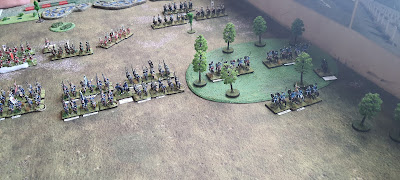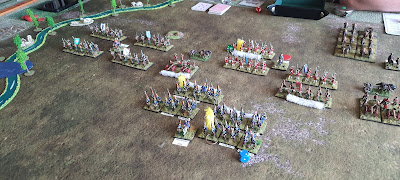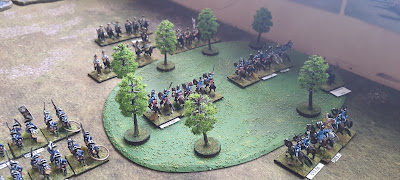As usual, le Duc is busier than the proverbial dog with the proverbial double appendage...

 |
'Get on with it!!!'
As some may know (we keep talking about them), our favourite set is Brent Oman's Field of Battle. Battle Command takes the same basic mechanics, but changes how the cards work, with a view to extending the influence of the multi sided dice of the commander, such that he has more influence and thereby choice, in terms of what cards to play and - depending on even or odd roll - whether to apply the card play to a single brigade, or the entire army.  Now, I thought about trying to explain all of this, but instead, I have opted to outline why the rules and mechanics are much better than everything else (a bold statement, but it's a bold post). Well, perhaps it's not that they are much better - it's simply that they address the problems of wargaming with an elegant and highly efficient design, which pokes a finger straight into the eye of traditional wargaming rules. There is no turn sequence Why would that ever be an advantage? Surely we need a turn sequence? The sequence comes from the cards which dictate moves, firing, morale, leadership & rally - with opposed rolling - the deck is random, but built based upon commanders in FoB, and dictated heavily by command rolls in BC. I can't predict what my options, and in a sense, 'luck' will let me do when i get to activate. I have to work with what I have (what - like a real battle?), and the deck and my command roll does the rest. Now in BC, I get a little more choice than in FoB, but it still works roughly in the same way. I can't look at the turn sequence and know that I will get to do 'X' before my morale check. I can't know that my firing will have 'X' effect on that flank statistically speaking, before the opponent's turn. What? No predictability? Don't we get that sort of predictability in real battles dammit? I rest my case. There are no modifiers What? But modifiers help to simulate what happens in real battles? Two aspects here. Multi sided dice - so if i get an 'up two' i may go from d6 to d10 and vice versa - this is genius in terms of probabilities. Conditions will affect dice ups/downs; more genius is the fact that even rolls have more benefits than uneven rolls, including routs, rallies, movement 'bonuses' etc.
The Army Morale counts down to exhaustion
The only other rules I have seen which replicate exhaustion really well are V&B, with division exhaustion. In FoB it's at the army level, and you give morale chips, to their advantage, to your opponent once you are worn down, and subject to a poor army morale roll - you will quit the field - so you always finish a game in 2-4 hours. Nope - there are no brigade morale checks and effects; to be fair this has never been a problem for me, though I know it has created issues for some. To the game. This was played with Steiner's 15mm 7YW Russian and Prussian collection.  | Prussian cavalry on the right flank, which would see its sneaky beaky move through the woods stymied by the Russians
 | Prussian assault in the centre
 | Prussian Grenadiers, hopeful of early gains, are pushed back
 |
|
|
 | 'I do not think zat zis is going to voork...'
 |
  | Although the Prussians are forced back on the left, and take a lot of casualties, they do not rout



 | The Prussians start to make real gains on the right despite the cavalry debacle, with infantry hoping to turn a Russian flank. Thankfully, Russian musketry is ...erm...somewhat less than stellar
 | Steiner points at the problem...
 | ...and then...just in the nick of time...Prussian Cuirassiers are unleashed, and flood across the river ready to support the right flank...huh? but instead make a speedy move toward the weakening Russian centre

 | The Prussian right
 | Impulsive Prussian horse gallop forward with intentions of raiding the Russian camp.
 | I'd love to say that the cavalry action on the right was simply a plan whereby the Russian horse would find itself compromised by having to check the movements of enemy horse...but no...it was a simple cock-up
 |
|
|
|
|
|

By game end, the Russians had survived one army morale roll, and another one pending (based on less cards and probability). It's a different mechanic and way of playing the mainstay of these excellent rules, but still very entertaining. It's hard to play other Horse & Musket rules while FoB/BC are in place, simply due to the fact that they are unconventional, lend themselves to simulating command decisions and simply work... |
|
Fine looking game photos and game, Darren. While I reckon most wargamers are on a never-ending quest for the perfect rules, refreshing to see that you have found the rules that tick all of the boxes and your search is over.
ReplyDeleteThanks Jon. I still like V&B and many sets - but with time being at a premium, to get a big game in with a groundbreaking set is always a goal.
DeleteFor my money, a bit of chaos and loosening player control in both an important and enjoyable element of gaming as is playing to a proper conclusion in a single session.
ReplyDeleteGary’s blog demonstrates quite a wide range of rule use, yet coming back to these always seems to the deliver the most satisfying game.
Thanks Norm. Aye, we both seem to keep coming back to these rules. A variant on the ww2 version is also coming out. I think for ww2, the degree of control, potentially outweighed by the machinations of the enemy, might make the system even more pertinent. I've always seen the early US Army in North Africa vs Rommel's Panzers, as very emblematic of the kind of chaos and planned 'in'action that the systems can represent. Of course, in Horse & Musket we see the same thing in spades. That feeling of the army commander not necessarily being lucky, but knowing what to do with his share of luck, comes across very succinctly. The design itself always flows well in comparison to other sets, I find.
DeleteA fine game with another excellent set from Piquet stable.
ReplyDeleteFOB3 and Bat Cmd on level pegging for me.
I just need a set that mitigates my dice rolling (Musketry rolls were consistently pants) and I will be fully sorted :-)
Definitely see the difference of deck vs command roll. Each option has its own advantages. Lull cards for instance become more a by product of a bad roll, over their inclusion in a crap deck. It's more a case of tweaking an already excellent design, over trying to 'fix something that isn't broken'.
DeleteBoth are excellent sets, and of course I fully concur with your judgement. :-)
ReplyDeleteOverall, I think the tweaks in BatCom give it the edge for me. Of course, Jared and I had already discussed some tweaks bit like the ones in the new set.
Thanks G. I like both. Now I think about it though - I somehow think that each set suits a period - the regimented style of 7YW and Napoleonic suits BC, whilst early modern era, and then conversely ACW, suits the card driven FoB ...at least all of this is true in my head :)
DeleteNot sure I agree, but it doesn't really matter; both are good systems regardless!
DeleteYeah - strange sense I got that 7yw and Napoleonic might benefit from the greater choice of BC whilst 1680-1720 and ACW seemed a little more chaotic and akin to FoB card decks.
DeleteHi tthanks for sharing this
ReplyDelete